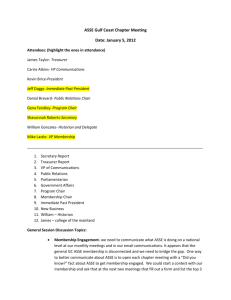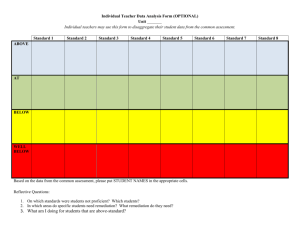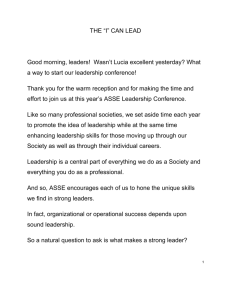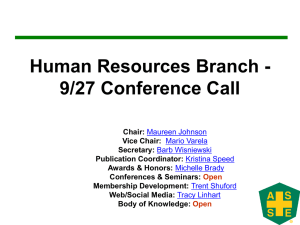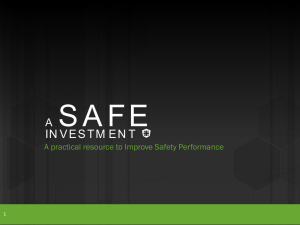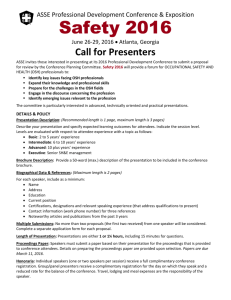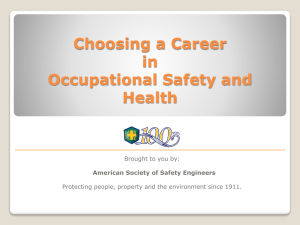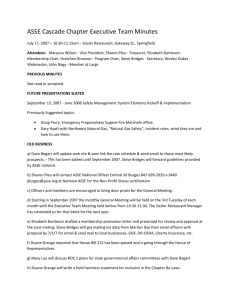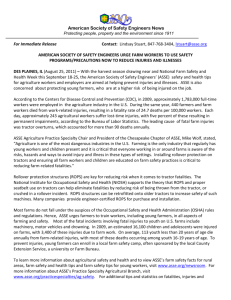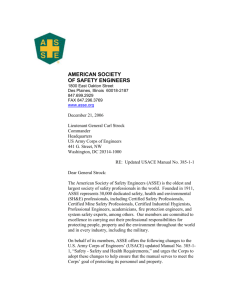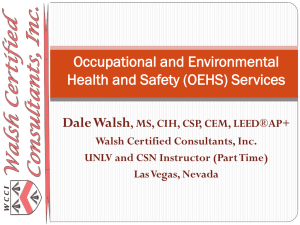American Society of Safety Engineers
advertisement
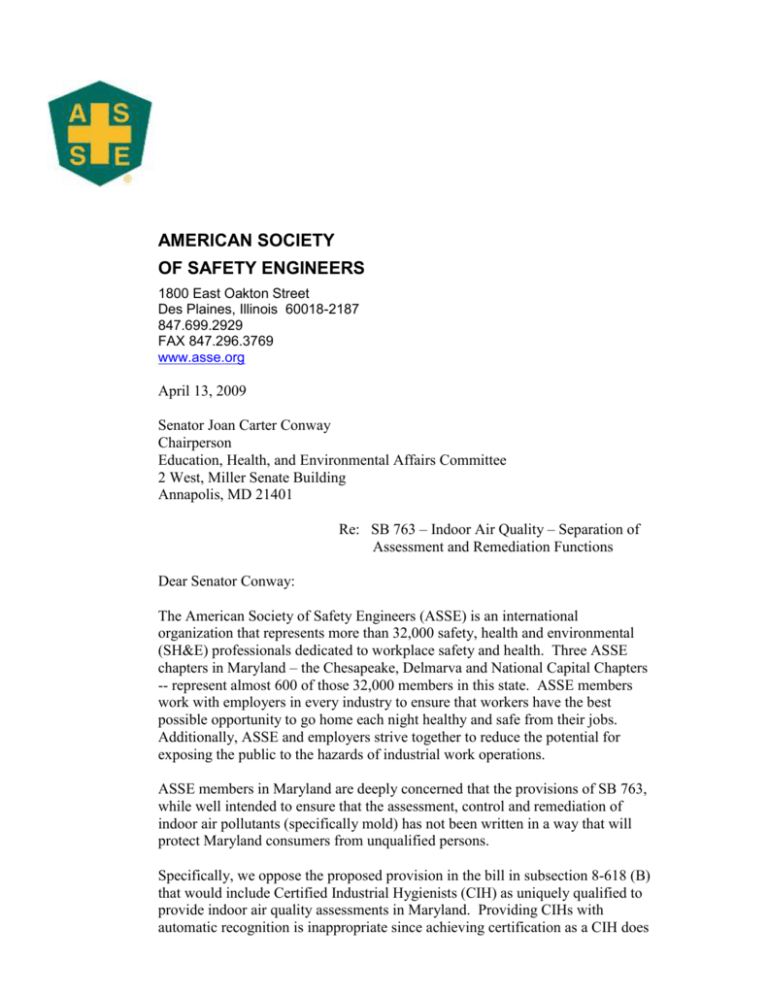
AMERICAN SOCIETY OF SAFETY ENGINEERS 1800 East Oakton Street Des Plaines, Illinois 60018-2187 847.699.2929 FAX 847.296.3769 www.asse.org April 13, 2009 Senator Joan Carter Conway Chairperson Education, Health, and Environmental Affairs Committee 2 West, Miller Senate Building Annapolis, MD 21401 Re: SB 763 – Indoor Air Quality – Separation of Assessment and Remediation Functions Dear Senator Conway: The American Society of Safety Engineers (ASSE) is an international organization that represents more than 32,000 safety, health and environmental (SH&E) professionals dedicated to workplace safety and health. Three ASSE chapters in Maryland – the Chesapeake, Delmarva and National Capital Chapters -- represent almost 600 of those 32,000 members in this state. ASSE members work with employers in every industry to ensure that workers have the best possible opportunity to go home each night healthy and safe from their jobs. Additionally, ASSE and employers strive together to reduce the potential for exposing the public to the hazards of industrial work operations. ASSE members in Maryland are deeply concerned that the provisions of SB 763, while well intended to ensure that the assessment, control and remediation of indoor air pollutants (specifically mold) has not been written in a way that will protect Maryland consumers from unqualified persons. Specifically, we oppose the proposed provision in the bill in subsection 8-618 (B) that would include Certified Industrial Hygienists (CIH) as uniquely qualified to provide indoor air quality assessments in Maryland. Providing CIHs with automatic recognition is inappropriate since achieving certification as a CIH does 2 not uniquely prepare anyone for being a mold investigator and, thus, does not warrant CIHs being singled out as the only SH&E profession capable of being licensed without any other qualifications having to be met. To be clear, ASSE is not opposed to a CIH performing this work. ASSE has many CIH members. In fact, its Industrial Hygiene Practice Specialty is the fastest growing of our sixteen practice specialties. But a much wider group of similarly credentialed professionals already provide competent professional services for evaluating, selecting, and performing sampling and analytical services necessary to address the potential presence and causes of mold amplification within occupied buildings. Certified Safety Professionals (CSPs) are one example. They are a core group of ASSE members, and their stringent, long-established certification examination administered by the independent Board of Certified Safety Professionals (www.bcsp.org) demonstrates an SH&E’s management capabilities of wide range of safety and health risks, including industrial hygiene. In addition to CIHs and CSPs, a variety of other similarly accredited SH&E designations that are accredited, once achieved, give SH&E professionals a professional foundation to gain the additional training and experience necessary to perform mold testing and remediation. These include but are not limited to Certified Hazardous Materials Managers, Certified Health Physicists, Certified Occupational Health Nurses, Certified Professional Chemists, Occupational Health and Safety Technologists, Professional Engineers, Registered Environmental Assessors, Registered Environmental Health Specialists, Registered Hazardous Substance Professionals, Registered Hazardous Substance Specialists, and Registered Safety Professionals. With proper training and experience in mold investigation and remediation beyond these professional certifications, any SH&E professionals holding one of these designations would be qualified to investigate, evaluate, and resolve issues related to mold amplification in occupied buildings to the same degree as a CIH. Recognizing only CIHs in SB 763 creates an unfair government-sanctioned economic advantage in one small group of people, putting other equally capable SH&E professionals who may already be providing quality mold services in Maryland at a significant economic disadvantage. ASSE’s members in Maryland oppose this limitation on their ability to provide such services and urge you to remove the CIH provision from the bill. Additionally, SB 763 prohibits the same person from performing assessments and remediation work at a property location. ASSE’s members in Maryland oppose this prohibition. It must be pointed out that “Person” is not defined in the bill. Numerous other laws define “Person” as a business, leaving the definition open to interpretation by the regulating authority. Thus, a business that may have assessment and remediation divisions with separate accountabilities could be prohibited from doing turn-key work and would have to outsource one aspect of the work, greatly increasing the cost to the property owner or tenant. We recognize that there are unscrupulous mold remediation operations that need to be regulated, but in our opinion, this bill falls short in taking the correct approach. 3 Since mold is the only pollutant specifically mentioned in the broad definition of air pollutants, it could be interpreted that mold is the principal focus of this bill. Unfortunately, there is still great debate in the scientific and health community as to what types of mold and at what level of exposure they become a health hazards. Absent specific data on unsafe exposure levels, it is difficult to mandate what methods and protocols would be used to appropriately assess airborne or settled mold spores that could become airborne with remediation efforts. Thus, mandating one job title and professional certification does little to ensure that the correct methodology is used for assessments or the correct control measures for remediation work. Fortunately, Maryland has a long history of recognizing and implementing reasonable laws and standards that have effectively protected its valuable work force and members of the public. Asbestos and lead are two air pollutants that pose serious health hazards to the industrial worker, property owners and residential occupants. The state, along with the federal government have existing laws and safety regulations that already effectively regulate these hazards and do not mandate separation of assessment and remediation work nor do they mandate a specific professional job title or professional certification. We believe that, if SB 763 were enacted, it would be interpreted as superseding and negating all of these other protective laws and standards because of the bill’s wide definition of air pollutants. ASSE and its members and chapters in Maryland are more than happy to provide whatever safety and health and engineering resources might be needed to assist you, the Legislature, or state agencies in efforts to protect the workers and members of the public from this (or any other) health hazard. We appreciate the opportunity to share our concerns and urge you to contact ASSE if our members can be of any help. Dave Heidorn, Manager of Government Affairs and Policy at dheidorn@asse.org or 847/768-3406 would be happy to put you in touch with our Maryland members. Sincerely, Warren K. Brown, CSP, ARM, CSHM President
